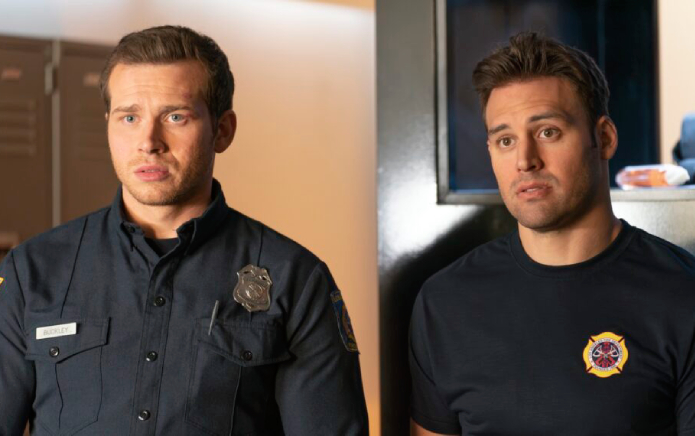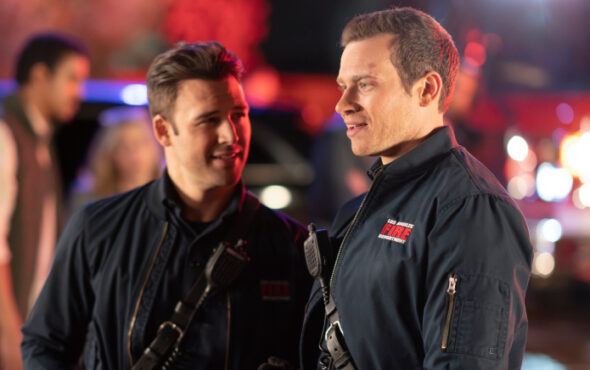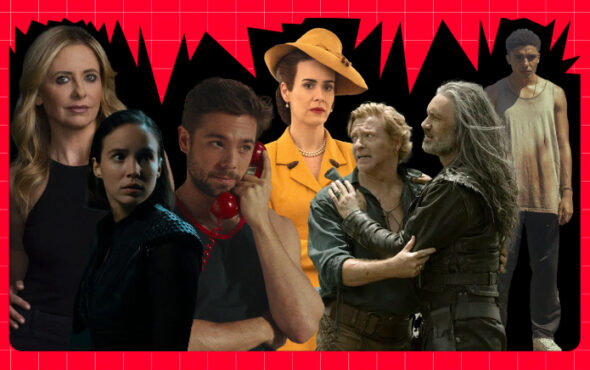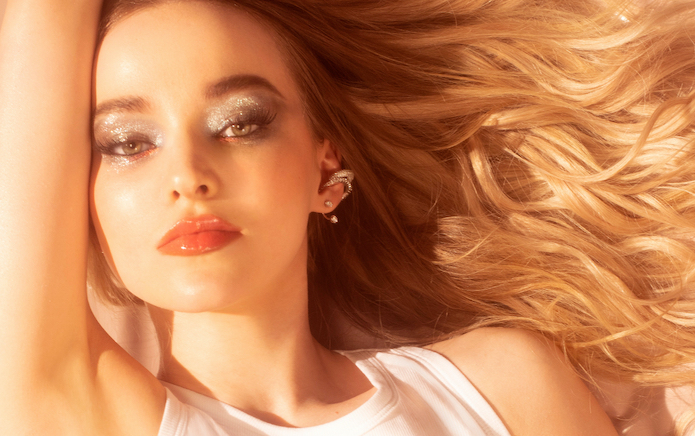
When Dove Cameron confessed her bisexuality on Instagram Live last year, she feared the LGBTQ+ community would reject her. “I was never confused about who I was,” the former Disney star says with unwavering firmness. Video footage of the moment is easily found online, yet, for the singer-songwriter, who has amassed more followers than even Harry Styles (42 million and counting), it flew relatively under the radar. “I felt like I wouldn’t be accepted and I had this strange narrative that people wouldn’t believe me.”
Now, over a year since coming out, the 25-year-old is forging her own path away from the household Disney glamour we’ve come to expect. Born Chloe Celeste Hosterman, the actress was raised in Washington before moving to California to pursue acting. It wasn’t long before she scooped up a role in one of the biggest Disney sitcoms, Liv and Maddie — one that would later land her an Emmy. Since then, the actress has landed snazzy new roles in The CW’s live-action reboot of The Powerpuff Girls and on HBO Max’s romance Field Notes on Love. Despite her hectic schedule, the artist finds the time to cram in a phone call on her day off from filming.
Her transition has been a quiet success, showcasing a post-genre sound with boundless energy, flair, and nuance. Her latest single, LazyBaby, digs deep into a break-up after four years, playing with light satire to pull the listener into her world of witty, unrestrained lyrics. Amusing voice notes reveal how the star is putting herself first: ‘Lazy baby, I ain’t playin’ / Time to get up, ain’t measurin’ up / Get gone’.
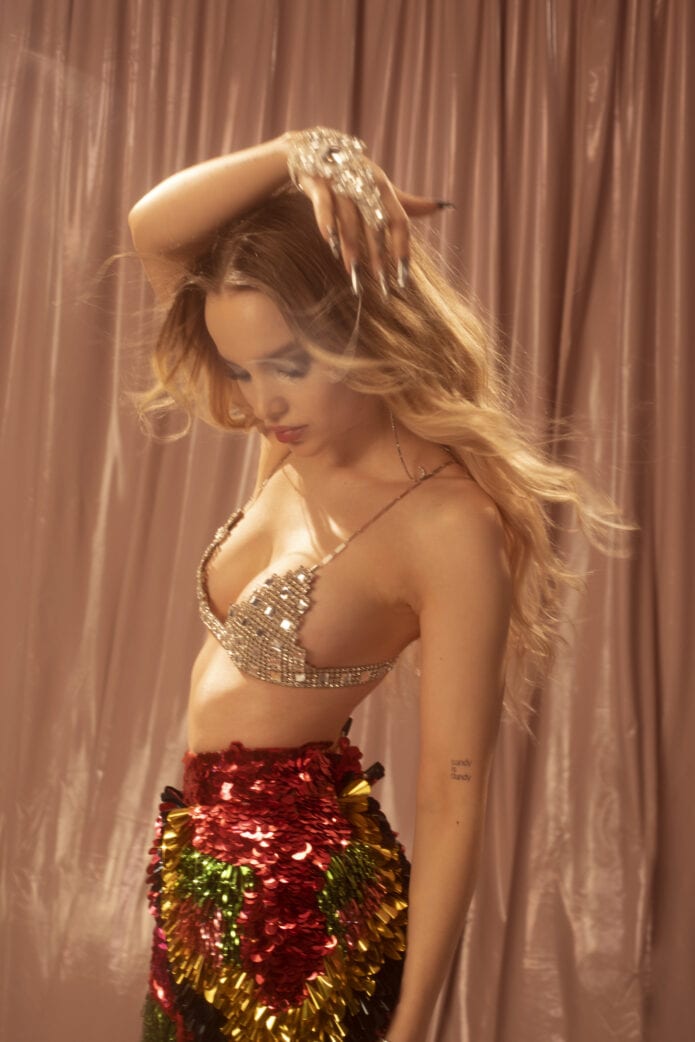
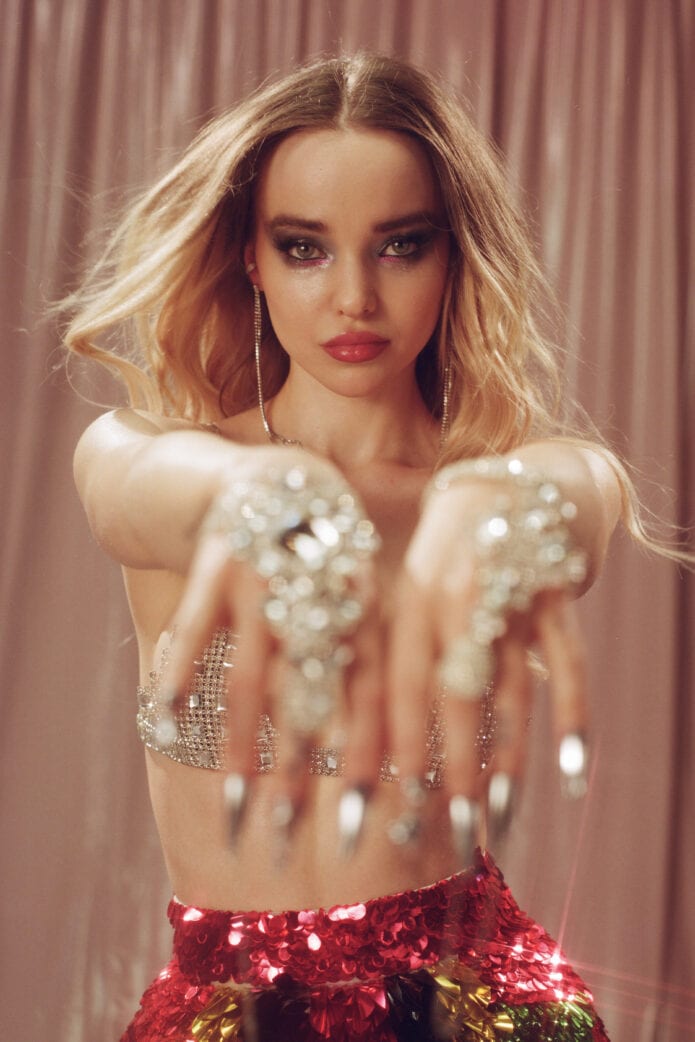
Writing with fresh openness, Dove evokes a trusting sense of honesty. “I was at the end of a very big chapter closing in my life and I was struggling to focus on myself, so when the relationship ended, I was having a hard time stepping back into my power and focusing on where I was,” she explains. Entering what she calls the “revolution and renaissance” of her career, Dove began to make the choice to move on. “I wrote LazyBaby to get from one part of the mourning process to the next. LazyBaby isn’t a breakup song, it’s a breakthrough song. It’s a song about loving yourself more than you love something that is no longer working. You’re taking all of the energy you’ve been investing into someone else and putting it back into yourself.”
The malleability of Dove’s growing sound is undeniable. LazyBaby’s smooth, funky delivery belies her contentious relationship with pop. In fact, the singer describes the mood of her early discography as “anti-pop” for its “crunchy, uptempo” takes. “I was afraid to dive headfirst into the pop sound because it’s really not who I am as a person. It was almost in rebellion. When I was a kid, I was like ‘If I’m blonde then I definitely can’t wear pink because it’s too cliche’,” she recalls, noting 10-year-old Dove Cameron’s stubbornly anti-pink childhood brand. “I was treating my pop records like that. I finally granted myself permission to blend a big pop sound and infuse myself into it. I have a couple of records lined up that are a departure from my previous sound and I’m really exposing myself.” It was a past, younger fondness of Marina and Kim Petras that inspired the singer to be creatively free with music. “With every release, I’m trying to stretch farther and be more open. I started in the public eye so young that I was afraid to feel unprotected,” she tells me. “I realised, recently, the music I listen to is a defence mechanism to keep myself hidden behind a wall of sound. I’m learning to infuse more of myself and I hope, through that experience, my fans are learning how to do the same. I hope they celebrate themselves and it emboldens them.”
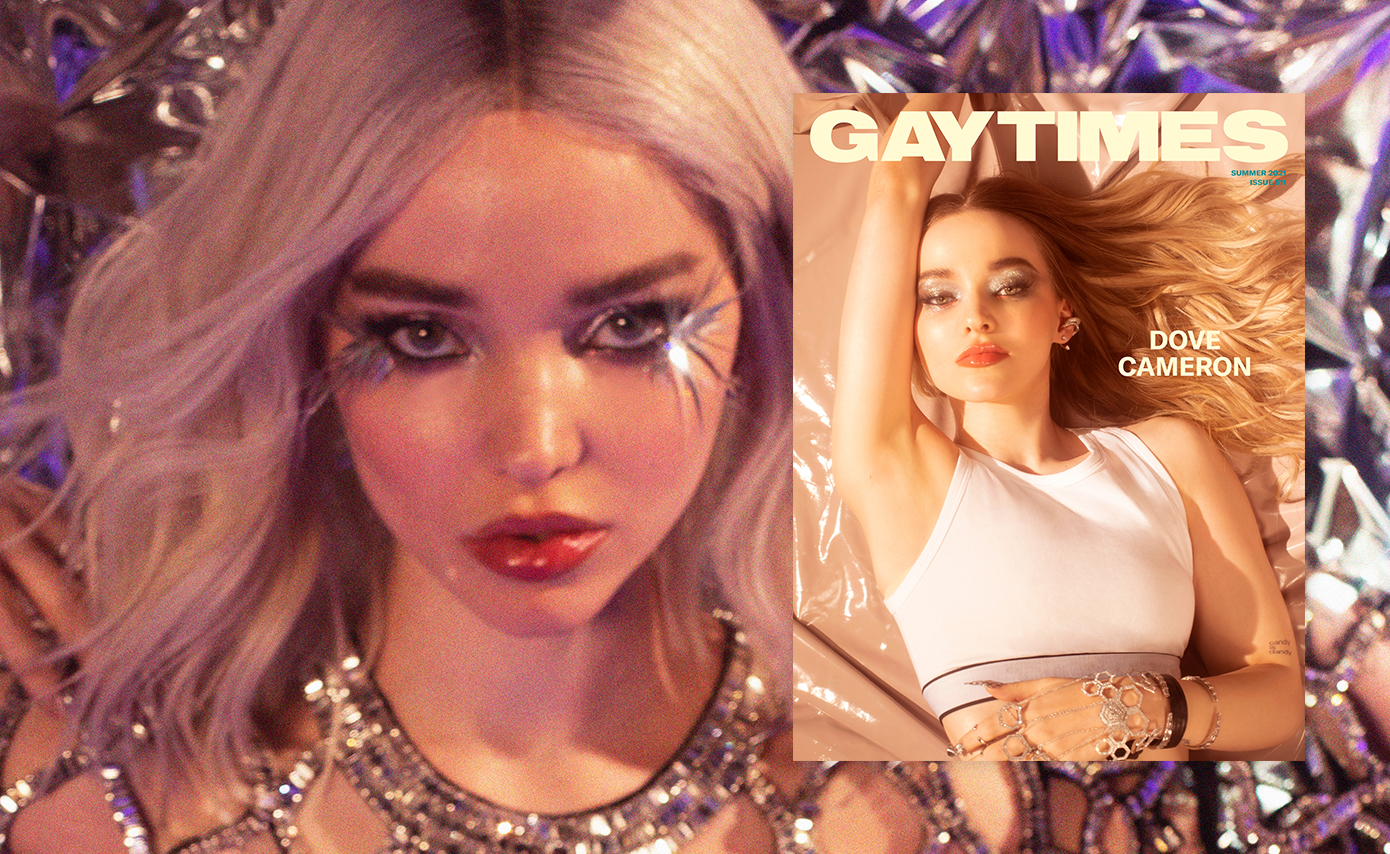
Glance through Dove’s Instagram and you’ll see enigmatic photo dumps capturing the performer’s overload of thoughts. Swipe and you’ll miss it – but the singer’s sexuality has never really been a secret to those paying attention. Tucked away between a slew of aesthetic posts, you’ll see allusions to her truest self weaved into carousel updates of her filming schedule and edgy selfies. Whether it’s a discreet photo of a co-star donning a navy jumper with the tagline ‘Queer as fuck’ or a throwaway tweet about falling in love with a girl at a traffic light, it’s always been there. Visibility, cryptic or not, has been key for Dove. “I hope it helps, that’s why I came out,” she says. “It felt like something that I could never talk about. I feel like the industry has changed a lot in terms of having room for people with platforms to be human and not to be picked apart. I was really nervous to come out and, one day, I dropped it because I was behaving like somebody who was out and I realised I wasn’t. When you are who you are, you assume people see that and then you realise, ‘No, I have to come out otherwise people aren’t gonna know.’”
Dove’s longing for a community loomed in the background of her life. It wasn’t long before the artist began to carefully unveil her identity online. “I’ve hinted about my sexuality for years while being afraid to spell it out for everybody,” Dove admits. What began as a heartfelt nod to the LGBTQ+ community quickly spiralled into claims of pandering. “I did a lyric video last year, for We Belong. It had moving line drawings of people falling in love,” she recalls, noting her frustration that the images were all straight and Eurocentric looking. “It was all a man and a woman making out and it was a weird moment for me. It was so bizarre that I had to ask to mix in different orientations. People started asking for hints about the video and I used different combinations of emoji couples making out. When the song came out, everybody got the idea that the song was a big LGBTQ+ anthem song and I found myself in this position where everyone thought I was queerbaiting.”
In that flustered moment, Dove chose to explore her identity alongside her fans. The artist took to social media to straighten things out. “I went on Instagram Live and said ‘Guys, I really needed to explain something to you. Maybe I haven’t said it, but I’m super queer. This is something I want to represent through my music because it’s who I am.’” The close call prompted the singer to reconsider her alignment with her queerness as well as her approach to her art. “It made me look at myself and question why I’m always with a boy in a music video or why I’m so uncomfortable in publicly expressing myself. This is something I have to go out of my way to state and that’s what made me come out. I wasn’t living the life that I thought I was.”
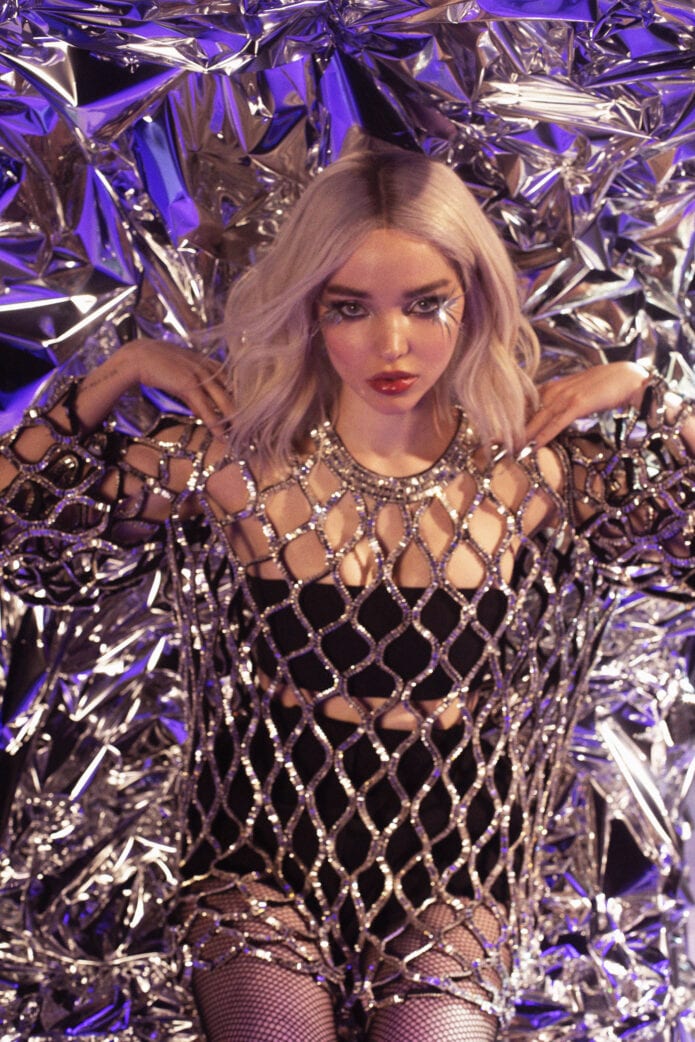

As Dove grew to accept herself, her fanbase grew with her. “Ever since then, I’ve had such an unbelievable relationship with my fans and we have this very safe space that we’ve created,” she says affectionately. “A lot of my fans have come out to me. A lot of my fans have told me that, because it’s such a non-issue with me. It wasn’t a big announcement. It was never something I really dove into. It was like here I am and here I always have been.”
Dove recalls a pop culture moment that resonated with her. “When Ben Platt came out to his dad, he said it was the most non-issue ever and that was so important to me. It was like, ‘Yes, I’m gay and, also, what are we having for dinner?’ My coming out to my fans was life-changing for me. I’m gonna cry now,” she exhales. “God, it was life-changing. I thought I would have to explore things that I wasn’t ready to or explain things that I wasn’t experienced speaking about. And because it never really happened, I’ve been able to transition into living a more honest life absolutely seamlessly. If I’m going to have a platform, I need to give others the same opportunity to feel acceptance and effortless support without feeling invaded or like they have to explain themselves. It would be my greatest joy in life to create an environment where that’s possible.”
I ask the burgeoning actress and TV star if she felt represented on the Hollywood screen she now dominates. “When I was younger, MTV was in its heyday. A Shot at Love with Tila Tequila was the queerest thing I’d seen. It’s an old MTV show and it’s truly terrible,” she laughs. She jokes about how obsessively she would listen to the Rent soundtrack. “I had Maureen as my reference for someone who was bi, but I didn’t really think much of it because the culture was so awful.” Although it sounds bleak, the artist was well aware of how things were stuck in an unforgiving era. “The celebrity culture was so abusive and over-sexualised. It was totally different from where we are now. I didn’t even notice that there really wasn’t queer representation,” she admits. “I felt so divorced from the narrative of Hollywood because it was so over cultivated. I think now the opportunity for what a celebrity can be has shifted. As a culture, we realised we need more queer representation, but, before that, I didn’t really see much room for change, because I didn’t think there could be any other way.”
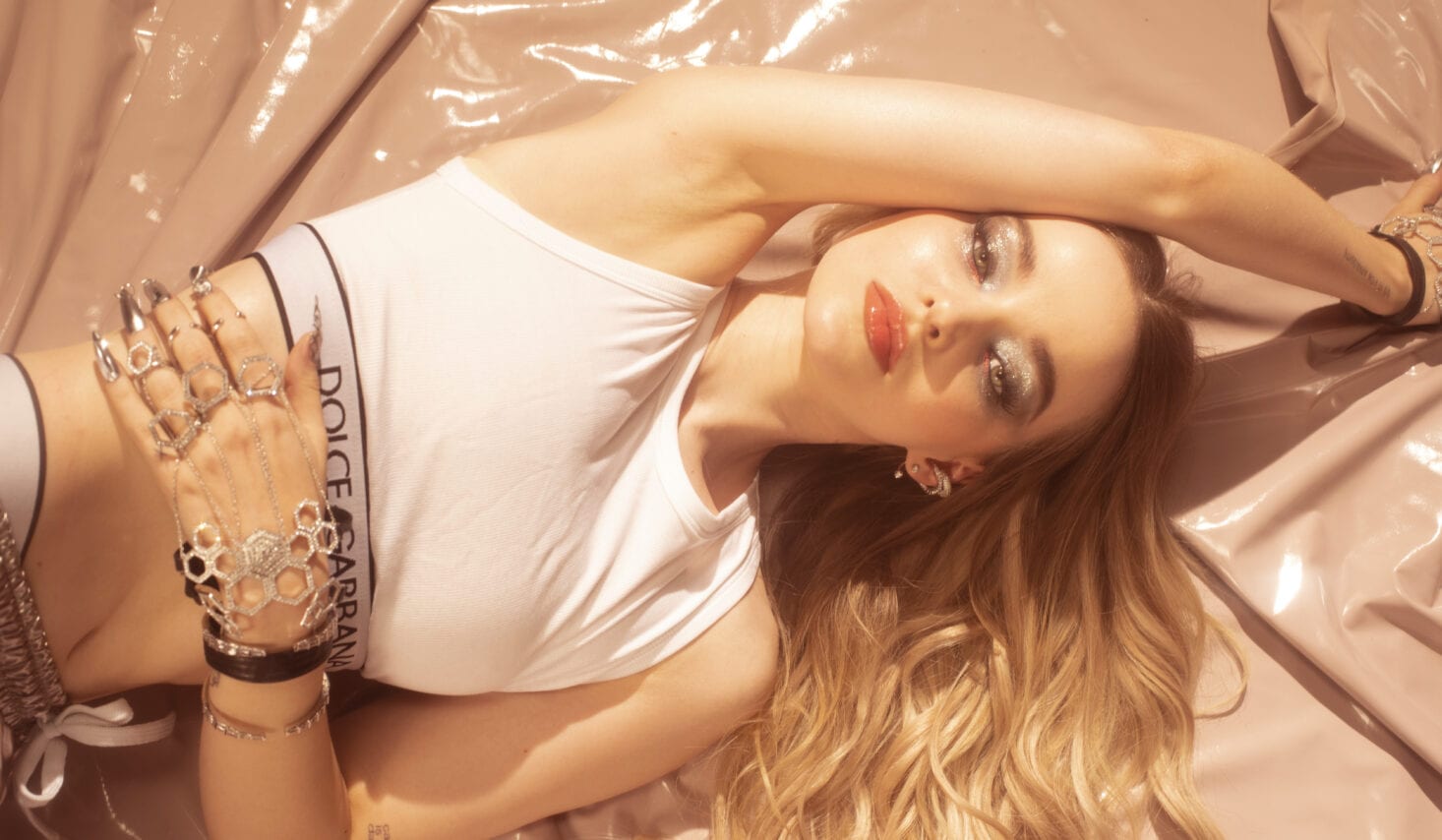
Tossing our favourite cultural moments back and forth, we both settle on common ground: the infallible Kristen Stewart. “Oh my god, that changed my life dude. It changed my fucking life,” she laughs. “I grew up in love with her not knowing what that meant. I always knew I wasn’t straight, but there were still a bunch of things for me to unpack and untangle.” It seems even mega-famous stars are not immune to the wayward charm of the 30-year-old actress. “I didn’t know wanting to be Kristen Stewart really meant that I was in love with Kristen Stewart. I couldn’t yet tell the difference. I worship the ground that she walks on. I want to be her best friend. Oh wait, I’m in love with her!”
When her beloved icons, Kristen Stewart and Cara Delevingne, became more visible, Dove started “questioning if I could do that,” she says. “It was the beginning of a bookmark in my brain thinking, ‘Wait a minute, can I live life honestly in the public eye — is that something that’s publicly available to me?’”
The answer, she realised, was yes. Moving forward, the singer has no reservations about how she wants to be perceived. “I’m not a label person, but I would say that I am queer and that’s probably my most accurate way to represent myself. With the process of coming out, it was about who I am as a whole rather than who I choose to date or sleep with. I’m choosing to love myself, to be who I am every day and not edit myself depending on the room that I’m in. I’m making no apologies for who I am. I’m not saying it slightly differently to make people more comfortable.”
Now that she has found solace in the community, which part gives her the most comfort? “The community is filled with people who have done so much work to accept and love themselves,” she says fondly. “I find the work you have to do on yourself begets your ability to support others.” She reflects a moment, then tears up again. “I have found unmatched support in the LGBTQ+ community,” she concludes. “I’m so grateful to even be doing this interview. I’ve been able to love myself through how others love and support me.”
